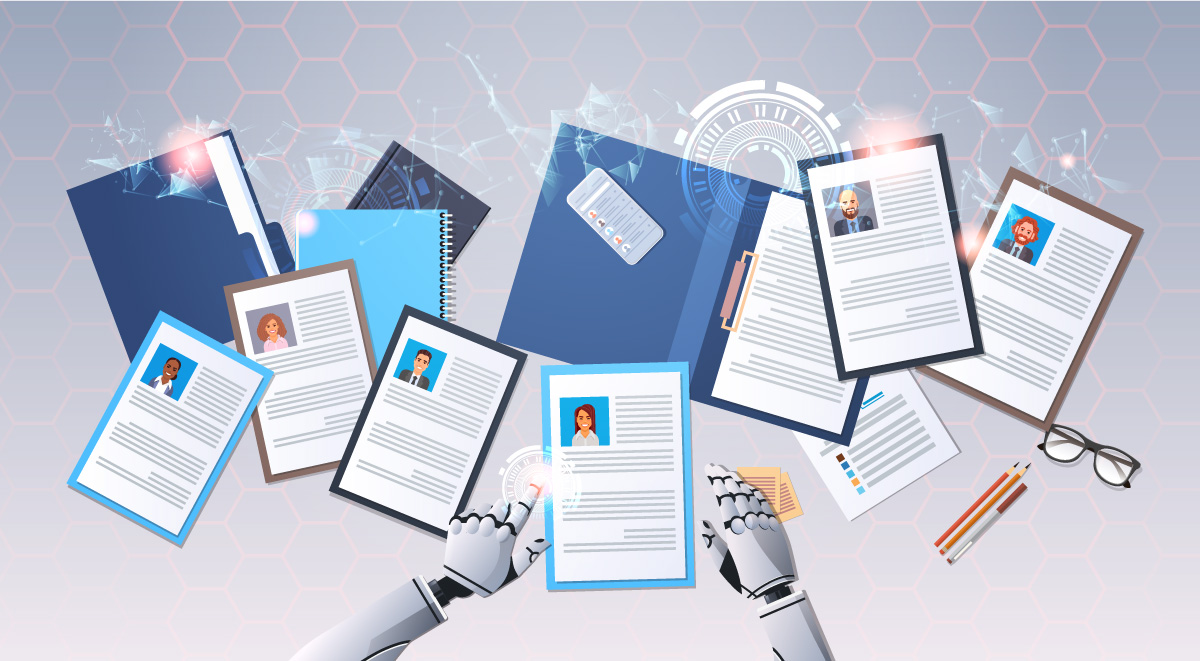There has been a growing need for automation in recruitment processes for some time now. Recruiters are tired of focusing the majority of their time on repetitive recruitment related tasks like processing multiple resumes manually, calling candidates and coordinating with their calendars to schedule interviews.
Though recruitment is an important process, it takes up loads of work time that should be spent on things other than just resume screening, like employee management, compliance, and more. This is why there is a growing requirement for automation in areas that are time-consuming. Today, a dominant theme in HR technology is AI. Artificial Intelligence for recruiting is a blooming category requirement of HR tech designed to reduce or remove time-consuming activities like manual screening and resume parsing.
AI for recruiting is the application of AI and ML to the recruitment processes to streamline some aspects of the recruiting workflow, especially repetitive high-volume tasks. It is a category of technology that allows enterprises to automate recruiting tasks and workflows so they can increase recruiter productivity, accelerate time-to-fill, reduce cost-per-hire and improve the overall diversity and productivity of the enterprises.
But many recruiters might question the need for automation where traditional methods are working just fine for them. The problem arises when old methods become habits that are difficult to break. These are a list of few reasons why Recruitment Automation is a necessary change:
INFORMATION OVERLOAD
The amount of information about candidates from various sources is exceeding the ability of recruiters to process that information. Most recruiters simply don’t have enough time to adequately source, assess and screen candidates. Recruiting automation systems to help companies analyze candidate data quickly to help them make better decisions, fast.
COMPETITIVE MARKET
Unemployment and increasing skill gap has led to a war for talent at many of the world’s leading companies. The intensification of the talent wars has led many companies to invest in technology that can help them reach qualified talent faster.
BETTER TECHNOLOGY
Recruiting automation is not something new. People have been talking about it for many years. However, until recently the technology did not exist to make recruitment accurate without human help. Recent advances in artificial intelligence and machine learning along with software innovation is making recruitment teams more efficient and productive.
“If recruiters and companies can learn to pair themselves with a specific AI, they can train it to understand a particular corporate mission and culture—so that recruiters feel like they leverage these chatbots and other similar technology as extensions of their teams, not as replacements for them.” - Dan Finnigan, CEO of Jobvite.
There is a misunderstanding if you believe that automation will get recruiters out of jobs. AI in recruitment is required only to make the jobs of recruiters easier and much more efficient. Rather than doing away with human touch, it is going to enhance human performance. Few aspects of recruitment that can be seamlessly automated to benefit enterprises are as follows:
- CV Screening - Up to 88% of resumes received for a role are unqualified. A recruiter spends 23 hours on an average screening resumes for a single hire. Hence, screening resumes is still the biggest bottleneck in recruitment that can now be solved with the help of technology, like chatbots and CV parsing software. For example, intelligent screening software automates the resume screening process. Integrated with an ATS, the software learns what the job requirements are and then learns what qualified candidates should look like based on previous hiring decisions.

- Pre-Qualification - All potential candidates will have some basic questions that need to be addressed by the enterprise about them. Answering each of them manually while maintaining the brand image is a difficult task. This is what has led to the creation of chatbots that answer any candidate queries through Machine Learning and saves recruiters time by responding in natural language and only involving them for complex or detailed queries.
- Application Tracking Systems - Manually keeping up with all the applicants in spreadsheets is painstaking. An ATS or applicant tracking system can immediately process applications, sorting through copious amounts of data through integration between workflow software and spreadsheet/database apps.
- Interview - Hiring candidates for niche or technical roles that require specialists to assess new candidates poses a challenge to enterprises. By analyzing candidates’ words, speech patterns, and facial expressions through various recruitment tools available in the market, enterprises can help find the best talent. Video interviewing and proctored interviews can be recorded and sent to panel members to assess at their convenience, and a detailed competency/skills/behavior report can be obtained with the right assessment tool.
Here are 12 things you should know about video interviewing software in 2019. - Background Check - Even if a candidate aces the pre-screening and interview, a background and work experience verification is essential before extending an offer. enterprises seek responsible and trustworthy employees for the company who will offer top-notch services and drive revenue, hence, it’s important to run background checks before making an offer. Background and reference checks should come back clean from former colleagues & managers.

These areas, if automated, can prove highly beneficial for enterprises with regards to their resources as well as ROI.
Benefits:
- Saving huge amounts of time and resources of the recruiter as well as the organization. Recruitment includes multiple high-volume tasks that take up the majority of the recruiters’ productive time that can be saved using AI, meaning recruiters will be ‘doing more with less’.
- Standardizing the hiring process through recruitment automation will ensure quality and accurate candidate assessment. With the assessments becoming standardized, it becomes easier to assess candidates basis their actual skills. It also helps avoid unconscious biases that recruiters might give in to sometimes.
- As a result, it will also lead to improved retention rates of the organization. If you hire employees with the required skills and culture fit (which can also be assessed using appropriate tests), it will automatically lead to increased employee satisfaction. HR professionals can use ML algorithms to formulate personalized rewards and incentive programs to boost employee engagement and make them feel more empowered in the workplace.
- Automation might seem like an expensive alternative, but in the long run, it can save enterprises up to 75% of their screening costs alone, and improve the revenue per employee by 4%!
Yes, there can be a few barriers to recruitment automation that might hinder with the seamless functioning of the entire process. Some of them are listed below:
- As discussed earlier, recruiters might be apprehensive to learn new ways of recruitment automation as compared to traditional ways of doing everything manually.
- Using technology and AI for any process requires a lot of data, to begin with. Collating and assembling data to start the process itself might be demanding.
- If technology eases man’s burden, it might also end up learning certain human habits that might become a challenge, like learning biases embedded in certain assessments or qualification rounds.
Conclusion:
By now we know, recruitment automation might come across as challenging, but a necessary shift in the industry. In summation, we can agree that recruiters will be able to conduct strategic hiring rather than spending their time back-filling. Recruiters will also be able to close loops with hiring managers when it comes to various hiring metrics like the quality of hire, etc. with the help of AI.







Leave a Reply